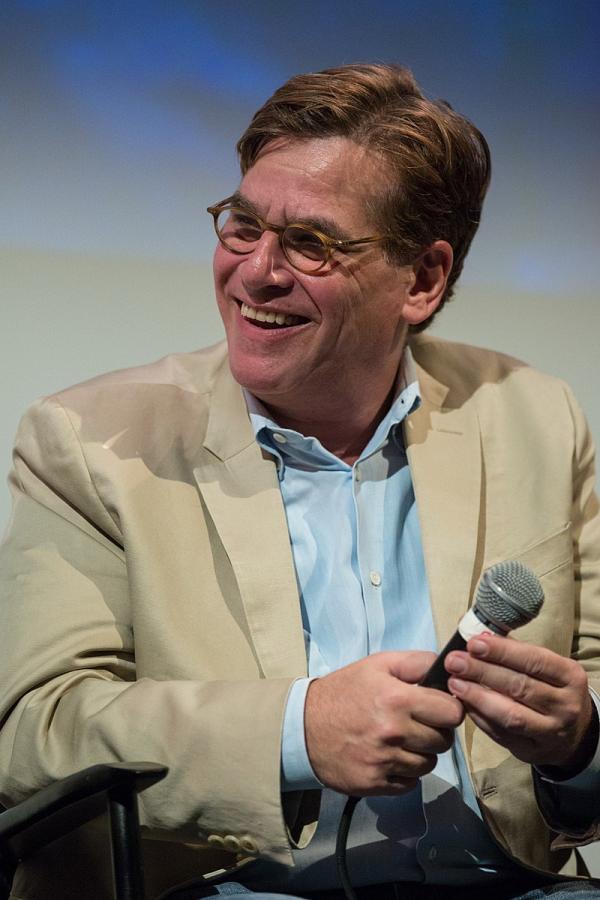Aaron Sorkin
National Humanities Medal
2023

—Dominick D

—Dominick D
Some writers specialize in intimate domestic dramas or autobiographical self-portraits, but playwright, screenwriter, and television scenarist Aaron Sorkin prefers grander stages. His works unfold in places as dramatic and rarefied as the White House (The West Wing), Capitol Hill (Charlie Wilson’s War), and a military courtroom where the fate of two Marines—and, eventually, a Marine colonel—will be settled (A Few Good Men).
“If there’s a through line,” Sorkin says of his body of work, “I’m very idealistic and romantic about American institutions.”
Sorkin’s interest in the people who inhabit the nation’s civic institutions is a family affair. “My father was in World War II; my mother, a public school teacher; my brother, a prosecutor; and my sister, a Naval officer who just retired last week from the Justice Department,” Sorkin says. “I was just always impressed with them, with their friends, and it also suits my style of writing, which is romantic.”
Even when not attuned to the corridors of power, Sorkin attends to unofficial American institutions: Major League Baseball (Moneyball), big-tech startups (The Social Network), and sports-news shows (Sports Night). “I’m drawn to people who are very good at something, whether it’s good at working for a fictional president in a fictional White House, or a cable sports show,” Sorkin says.
Sorkin received early training in transporting audiences to unfamiliar terrain. “My parents took me to see plays all the time,” he says. While studying theater at Syracuse University, Sorkin began writing for pleasure, but it was later that he began jotting down scenes for a future play. “I had all kinds of jobs, one of which was bartending at Broadway theaters,” Sorkin says. “You don’t do anything for most of the first act, so I would write this play on cocktail napkins behind the bar.”
The play in question, A Few Good Men, uses the setting of a court-martial to reckon with issues like duty and justice. Navy JAG Corps Lieutenant Daniel Kaffee draws the assignment of defending a pair of Marines whose hazing-like actions have led to the death of a fellow Marine—actions, it becomes apparent, that had originated as an order from Marine Colonel Nathan R. Jessup.
“What people remember as the climax is ‘You can’t handle the truth,’ but it’s not,” Sorkin says, referring to the famous line barked by Jessup. “The emotional climax is when Kaffee goes from a guy who at the beginning is making fun of the whole idea of honor and saluting, . . . [by] the end of the film says, ‘Don’t call me son. I’m a lawyer and an officer of the United States Navy.’”
Sorkin’s imagination is fed by extensive research. “You don’t even know what questions to ask when you’re starting,” he says. “It’s a little bit like walking through a dark forest with a flashlight. You can only see as far ahead of you as that beam of light will go, but the further you walk, the further you can see.”
After writing the White House-set romantic comedy-drama The American President (1995), Sorkin was told by a friend that a series set among senior staffers at 1600 Pennsylvania Avenue might make for good TV. Sorkin shrugged off the notion, but it just so happened he was meeting the next day with TV producer John Wells.
“I thought this was going to be a ‘Nice to meet you’ lunch,” Sorkin recalls, but the lunch turned out to be all business. “John was there with Warner Bros. executives and CAA agents. He said, ‘So what do you want to do?’ And instead of saying, ‘I’m so sorry, there’s been a misunderstanding,’ I said, ‘I want to do a show about senior staffers at the White House.’”
The West Wing aired on NBC from 1999 to 2006, netting Sorkin multiple Emmy Awards. He also won an Academy Award for writing The Social Network (2010), and Golden Globe Awards for writing that film, Steve Jobs (2015), and The Trial of the Chicago 7 (2020), the last of which he also directed.
Sorkin sees his devotion to, and curiosity about, American institutions as something of an obligation. “My father’s parents, my grandparents, like a lot of people’s grandparents, were chased to this country—in their case, from a Russian ghetto,” says Sorkin, who remembers charting the journey they made on a globe. “I saw all the places in between Russia and here that they could have stopped and said, ‘OK, we live here now,’ but they didn’t. At some point in that trip, they stopped running from something and started running toward something.”
—Peter Tonguette